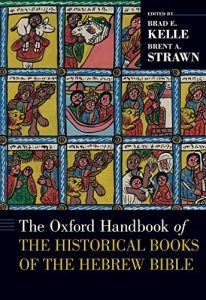KELLE, B. E. ; STRAWN, B. A. (eds.) The Oxford Handbook of the Historical Books of the Hebrew Bible. New York: Oxford University Press, 2021, 616 p. – ISBN 9780190261160.
Uma coleção de ensaios com recursos para a interpretação dos livros de Josué, Juízes, Samuel, Reis, Crônicas, Esdras e Neemias. O volume não é exaustivo em sua cobertura, mas examina aspectos desses livros que são considerados essenciais para a interpretação ou que são representativos de tendências significativas na pesquisa atual e futura.
sua cobertura, mas examina aspectos desses livros que são considerados essenciais para a interpretação ou que são representativos de tendências significativas na pesquisa atual e futura.
The Oxford Handbook of Historical Books of the Hebrew Bible is a collection of essays that provide resources for the interpretation of the books of Joshua, Judges, Samuel, Kings, Chronicles, Ezra, and Nehemiah. The volume is not exhaustive in its coverage, but examines interpretive aspects of these books that are deemed essential for interpretation or that are representative of significant trends in present and future scholarship. The individual essays are united by their focus on two guiding questions: (1) What does this topic have to do with the Old Testament Historical Books? and (2) How does this topic help readers better interpret the Old Testament Historical Books? Each essay critically surveys prior scholarship before presenting current and prospective approaches.
Taking into account the ongoing debates concerning the relationship between the Old Testament texts and historical events in the ancient world, data from Assyrian, Babylonian, and Persian culture and history are used to provide a larger context for the content of the Historical Books. Essays consider specific issues related to Israelite/Judean history (settlement, state formation, monarchy, forced migration, and return) as they relate to the interpretation of the Historical Books. This volume also explores the specific themes, concepts, and content that are most essential for interpreting these books. In light of the diverse material included in this section of the Old Testament, the Handbook further examines interpretive strategies that employ various redactional, synthetic, and theory-based approaches. Beyond the Old Testament proper, subsequent texts, traditions, and cultures often received and interpreted the material in the Historical Books, and so the volume concludes by investigating the literary, social, and theological aspects of that reception.
Table of Contents
Preface
Abbreviations
List of Contributors
Introduction, Brad E. Kelle and Brent A. Strawn
I. Contexts: Sources, History, Texts
1. Historiography and History Writing in the Ancient World, Richard D. Nelson
2. Assyrian and Babylonian Sources, Martti Nissinen
3. Achaemenid Political History and Sources, Amélie Kuhrt
4. Text-Critical Issues with Samuel and Kings, Julio Trebolle Barrera and Eugene Ulrich
5. Text-Critical Issues in Ezra-Nehemiah and 1 Esdras, Lisbeth S. Fried
6. Early Israel’s Origins, Settlement, and Ethnogenesis, Ann E. Killebrew
7. Israelite State Formation and Early Monarchy in History and Biblical Historiography, Walter Dietrich
8. The Later Monarchy in History and Biblical Historiography, Paul S. Evans
9. New Perspectives on the Exile in Light of Cuneiform Texts, Laurie Pearce
10. New Perspectives on the Return from Exile and Persian-Period Yehud, Mary Joan Winn Leith
II. Content: Themes, Concepts, Issues
1. Israelite and Judean Society and Economy, Roger S. Nam
2. Politics and Kingship in the Historical Books, with Attention to the Role of Political Theory in Interpretation, Geoffrey Parsons Miller
3. The Distinctive Roles of the Prophets in the Deuteronomistic History and the Chronicler’s History, Marvin A. Sweeney
4. The Various Roles of Women in the Historical Books, Mercedes L. García-Bachmann
5. Exogamy and Divorce in Ezra and Nehemiah, Herbert R. Marbury
6. Yahwistic Religion in the Assyrian and Babylonian Periods, Richard S. Hess
7. Yahwistic Religion in the Persian Period, Melody D. Knowles
8. A Theological Comparison of the Deuteronomistic History and Chronicles, Matthew J. Lynch
9. Divine and Human Violence in the Historical Books, Douglas S. Earl
III. Approaches: Composition, Synthesis, Theory
1. The So-called Deuteronomistic History and Its Theories of Composition, Thomas Römer
2. Reading the Historical Books as Part of the Primary History, Richard S. Briggs
3. Synchronic Readings of Joshua-Kings, Serge Frolov
4. The Rise and Fall of the So-Called Chronicler’s History and the Current Study of the Composition of Chronicles, Ezra, and Nehemiah, Ralph W. Klein
5. 1 Esdras: Structure, Composition, and Significance, Kristin De Troyer
6. Synthetic and Literary Readings of Chronicles and Ezra-Nehemiah, Steven J. Schweitzer
7. The Role of Orality and Textuality, Folklore and Scribalism in the Historical Books, Susan Niditch
8. Feminist and Postcolonial Readings of the Historical Books, Cameron B. R. Howard
9. The Deuteronomistic History as Literature of Trauma, David Janzen
IV. Reception: Literature, Traditions, Figures
1. Joshua in Reception History, Zev I. Farber
2. Deborah in Reception History, Joy A. Schroeder
3. Samson in Reception History, Kelly J. Murphy
4. Saul in Reception History, Barbara Green
5. David in Reception History, Dominik Markl
6. Solomon in Reception History, Sara M. Koenig
7. Ezra and Nehemiah in Reception History, Armin Siedlecki
8. The Historical Books in the New Testament, Steve Moyise
